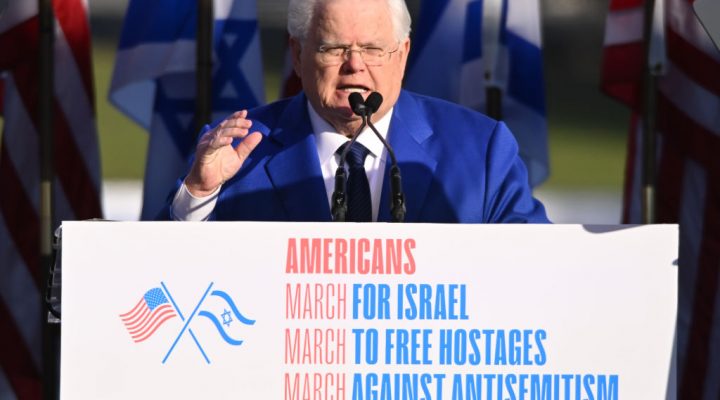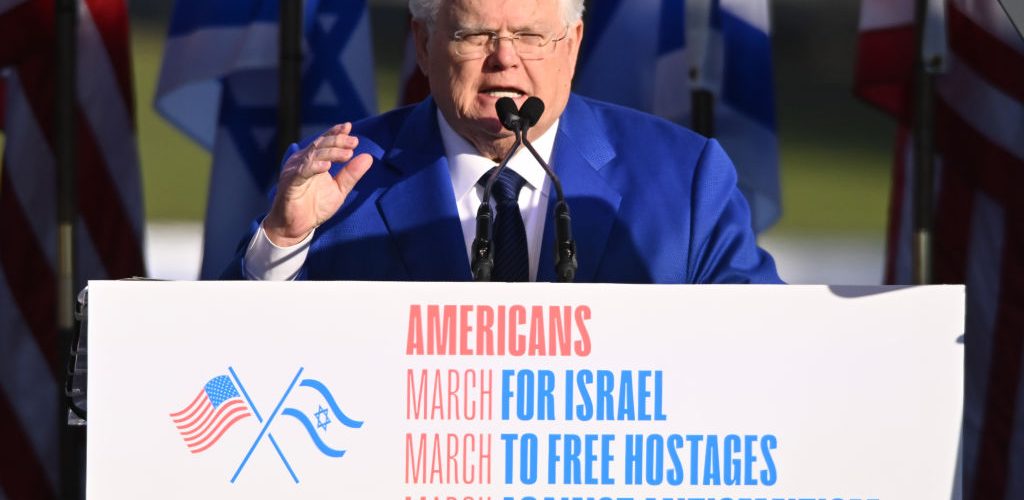Christian nationalism in the United States seems more alive than ever. Project 2025 threatens to erode the separation of church and state, Donald Trump is hailed as a messiah following his assassination attempt, and at the state level, Ten Commandments displays, Bible study and history classes emphasizing the Christian origins of the United States are being integrated into the curriculums of this upcoming academic year.
Alarmed faith-based organizations have responded with justified urgency, often from a Christian perspective — such as the Christians Against Christian Nationalism Campaigns campaign. Resources and reports from Americans United, Baptist Joint Committee, Interfaith Alliance and Faithful America are raising the alarm. They highlight how Christian nationalism infiltrates politics, attacks reproductive rights, bans books with queer narratives and undermines voting rights.
Yet there is a blatant, painful silence when it comes to Israel’s war on Palestine and the role of Christian Zionism.
Christian Zionism is the belief, held by Christians, that the modern state of Israel fulfills biblical prophecy, leading to uncritical political support of Israel by Christians. This support may involve political lobbying, critiquing pro-Palestinian protests, donating to the Israel Defense Fund, tourism to Israel and supporting Israeli businesses.
Christian Zionism, often seen as reconciliation between the Jewish and Christian people, is deeply antisemitic.
Christian Zionism, often seen as reconciliation between the Jewish and Christian people, is deeply antisemitic. It has theological roots in the return to Israel of the Jewish people leading to the end times and return of Christ — culminating in the destruction of the Jewish people. The support of the Jewish people in Israel is therefore not for their safety or protection but for their role as pawns in a Christian theology of salvation.
Christian Zionism also is not about a love for Israel. It is about Christian nationalism. The covenant with Abraham, which serves as a pillar for Christian Zionism, says, “I will bless those who bless you, and whoever curses you I will curse.” This births a dangerous nationalist prosperity gospel where American support of Israel leads to its blessing as a nation.
And then there is America’s national narrative — a rich story frequently glorified as one of peaceful Christian settlers and their escape from religious persecution. It was proclaimed by John Winthrop as a “city on a hill”, a nation chosen by God, akin to a “covenant land” and a “new Israel’”.

Perlei Toor
This narrative dangerously parallels the idea that both Palestine and America were “lands without a people for a people without a land.” This was, and is still, not true. This deliberate myth, in both cases, justified the removal of native inhabitants to purify the land, legitimizing dehumanizing stereotypes of Native Americans and Palestinians as underdeveloped populations who had to be removed for the settlers to properly undertake the “destined use of the soil.” Both Native Americans and Palestinians historically and currently reside on and care for these lands. Erasing their presence perpetuates ongoing violence.
Historically, figures like William E. Blackstone, former President Woodrow Wilson and former President Ronald Reagan reinforced this narrative politically. They depicted Israel and the United States as sharing a divine destiny, with phrases like “these immigrants to Palestine are indeed the Jewish Puritans” and “the Jews are bringing prosperity and happiness in Palestine.”
For Christian nationalists, these elements of the American national narrative are essential. They claim God gave the United States to its founders, and settlers were fulfilling a religious duty to take over the land from its “savage” inhabitants and make it a Christian nation. In Israel, Christian nationalists see a reflection of their own narrative, leading to the dangerous international projection of Christian nationalism.
The result of this theology is significant support for Israel among evangelicals. Forty-seven percent of evangelicals strongly support Israel, with a third of evangelicals currently supporting Israel because of their religious beliefs. The belief that “God’s covenant with the Jewish people remains intact today” had the greatest impact on support for Israel — trumping political, theological, sociological and demographic factors.
U.S. Christian nationalist support for Israel has tangible consequences. For every one Jewish Zionist in the United States, there are 30 Christian Zionists. The effect of this support is demonstrated through, for example, Nikki Haley signing missiles to send to Israel, evangelicals going to Israel as war volunteers, or Israel’s Prime Minister Netanyahu using biblical passages to justify violence to an international Christian audience.
Ignoring this support creates a blind spot in campaigns against Christian nationalism. Viewing Christian Zionism as solely an international issue reinforces the ideology of American exceptionalism — the belief that America is a unique and unparalleled nation. By focusing solely on the domestic effects of Christian nationalism, we inadvertently preserve the very belief system that underpins it.
Christians worship a Jewish, Middle-Eastern refugee: We are called to be concerned about injustices worldwide through an enlarged sympathy with the expansive, borderless kingdom of God.
If the aim of fighting Christian nationalism is to keep it out of American policy, we must also strive to keep it out of foreign policy.
If a campaign against Christian nationalism truly comes from a Christian perspective, it is blatantly hypocritical not to speak on Christian Zionism. If the aim of fighting Christian nationalism is to keep it out of American policy, we must also strive to keep it out of foreign policy. If the aim of fighting Christian nationalism is to protect religious freedom, the current of antisemitism within Christian Zionism means we must address it.
Christian Zionism is deeply entrenched in America’s current Christian nationalist movement. While this article does not aim to diminish the important work of organizations combating Christian nationalism, their silence on Christian Zionism is painful. This work has never been more important, and these campaigns have the possibility to make genuine change by calling out Christian Zionism.
Unlike Christian nationalism, Christian Zionism is a widely held belief but not a deeply held one. Speaking up could have a significant impact on America’s Christian-based support for Israel
If the discussion about Christian nationalism is really about interrogating the way Christian beliefs dominate American politics, Christian Zionism must be part of the conversation. As Christians concerned about Christian nationalism — all 40,000 of us, according to the Christians Against Christian Nationalism campaign — we cannot focus solely on American politics and ignore that Christian nationalism, through Christian Zionism, has the deaths of almost 40,000 Palestinians on its hands.
Perlei Toor is a Master of Theological Studies student at Harvard Divinity School, specializing in religion, ethics and politics.
Related articles:
How Zionism poisoned Western Christianity
The beginnings of modern Christian Zionism
As antisemitism and Islamophobia skyrocket, the effects ripple through politics


